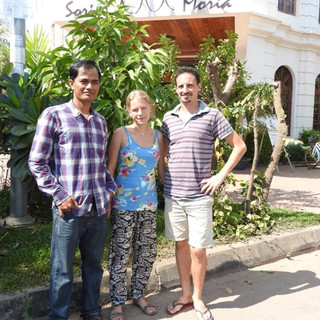Stake Hotel
- Anna Książek, Andrea Pucci
- 14 gru 2015
- 5 minut(y) czytania
Zaktualizowano: 22 kwi 2021

Can a hotel be a social enterprise? Yes, it can! Even a high standard one. After a few months of sleeping in a tent, on the floor, mattress, quite rarely in the bed, we spent a few days in a boutique hotel, with Jacuzzi, swimming pool and towels rolled in the shape of a swan and covered with small flowers. However, Soria Moria doesn’t mean only comfort for tourists; it is above all an organization which supports a lot of local initiatives and creates unique opportunities for its own workers to develop.
Ken, founder, Norway: We started up in late 2007. There were multiple reasons. I started an NGO in 2006 working with education and one of the things which I noticed was the need for job training. Kristin, with whom I started Soria Moria, had a past experience with a guesthouse which she built and set up. She is also an industry professional. I had a business background and some cash. We thought it would be interesting and more sustainable to have a business approach to NGO projects.
The concept of social enterprise is still quite new in Cambodia and over the whole South East Asia (SEA). Those which already exist usually sell clothes, scarves, or souvenirs. Soria Moria is the first hotel we met which connects together the idea of business and changing the world.
Samnieng, main manager of Soria Moria, Cambodia: We try to run a business which will be as socially oriented as possible. We were the first to set up this kind of business and we try to be an example for other businesses, so they can understand that it’s important to care also about the community, not just making profit. In our project we try to care about community, education of employees, and environment.
Already before entering you can feel that’s not the usual hotel. They started a parallel social enterprise to rent bikes, the White Bicycle, where half the money goes to funding scholarships for local students. Past the doorstep of Soria Moria you find yourself in the hall, full of different kind of souvenirs which tourist can buy, supporting at the same time local NGOs and social enterprises, e.g. Tonlé, which produces and sells clothes made from recycled materials and promotes the zero waste philosophy, or Friends International, which supports the poorest kids in Cambodia. As you walk through you are welcome by a smiling worker, always happy to help. In our case it was Samnieng, the Cambodian manager of the hotel, to come and meet us. Officially, he is also the main stockholder, but as for the ownership Soria Moria has its own idea.
Samnieng: Every employee after one year of work in Soria Moria becomes also the owner. We have a formula to calculate the share. It is based on 3 criteria: how long they work, what is their responsibility and what is their salary.
Ken: Soria Moria’s empowerment through ownership is supposedly the first of a kind in SEA. The idea is to bring owners responsibility and rewards. I have had some past experience in employee ownership strategies. However, only in a western and developed world. In SEA this type of strategy is seldom used and we thought it would be interesting to see how it would work and if it would make a difference in terms of leadership and feeling of responsibility.
51% of Soria Moria’s ownership belongs to the workers. And that’s not the only way to empower and support them. One of Soria Moria’s basic ideas, and it’s greatest achievement, is the education of employees creating the opportunity for them to gain professional experience.
Samnieng: Soria Moria’s biggest success is employees’ education. I can see that many of them improve a lot. At the beginning we had a lot of employees who didn’t know how to read and write and how to work with customers. There were mainly farmers and they never went to school. A lot of employees, especially in the housekeeping area, they had zero education. We set up a program to train and educate them on how to work better and better. Everybody learns a lot through our system. Other hotels don’t do that, they just hire educated staff.
Ken: Biggest achievement of Soria Moria? Maybe providing higher education and work experience to a number of youth, bringing in ethics and good business practice to Siem Reap.
Poch, worker: I like to work in Soria Moria because I can learn new things. And I became an owner. And one more thing: I can study abroad to learn new things. This hotel has an exchange program with a hotel in Norway.
The exchange with a Norwegian hotel is the next chance for workers to develop, get to know the world and practice languages. Every year two people from Cambodia swap with two people from Norway. This year one of them is a cook.
Richard, cook: Our hotel in Norway has an exchange program with Cambodia. It’s a great opportunity to travel and work. It’s very exciting to learn about Cambodian food and flavours. I’m also happy to work in Soria Moria, it’s a great hotel in which you can be sure that your money ends directly in the hands of the staff. It’s not the big chain with the one owner who has over hundreds of hotels and takes all the money. It’s a very nice hotel, more personal and with better treatment for guests than so many others.
Being a guest in Soria Moria it’s not only about nice service, but also the possibility to support the local community. Unfortunately, not so many tourists care about that. That’s why one of the biggest challenges for Soria Moria is to survive just as a hotel.
Samnieng: Our biggest challenge is competition. We are a social enterprise, but also a normal business. Competition and market are the same. Only for some travellers who want to support our project we are the first choice, most tourists don’t care. They just want to stay in a nice hotel. That’s why we have to be sure we constantly improve our service.
Soria Moria is one of those social enterprises we would like to see everywhere. Although the main activity, running the hotel, is not directly connected with changing the world, in everything they do they show that you can make a difference running any kind of business. It’s enough to be fair: help your workers to grow, pay them fair salaries, offer the possibility to develop, support them with the problems they face. It’s particularly important in countries like Cambodia, where people are not prone to taking initiative. There is a lot of passiveness which is difficult to overcome. That’s why so many NGOs and social enterprises are created by foreigners. Most of them, fortunately, see the need of supporting and empowering the local community. Just to name a few: Smateria, a company which produces bags and other items using unconventional materials, partly from recycling, employs many Cambodians, often from disadvantaged background, giving them the opportunity to earn money and answering their daily problems such as creating daily care room for children; New Leaf, a café with good coffee and much more, opens its space to different social initiatives and donates the income to local NGOs; SGFE produces ecological coal, safer for health and good the environment, employing the poorest Cambodians as well as mentally disabled people. Often those companies refrain from calling themselves a social enterprise, but what they do and how they do it meet completely the criteria. Nearly all are open to foreigners but using the local energy they are changing the reality around them. The discussion why most social initiatives were created by people from outside requires a long analysis of Cambodian history and current situation, as well as the character of its inhabitants. Although it’s difficult to change, or rather because of that, enterprises like Soria Moria, which offer leadership to locals, are especially important. Even if not everything works as it should from our western point of view.
It’s only our point of view.
Ken Oishi – founder of Soria Moria.
Samnieng Roeun – current manager of Soria Moria.





































Komentarze